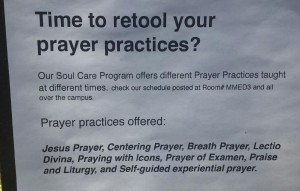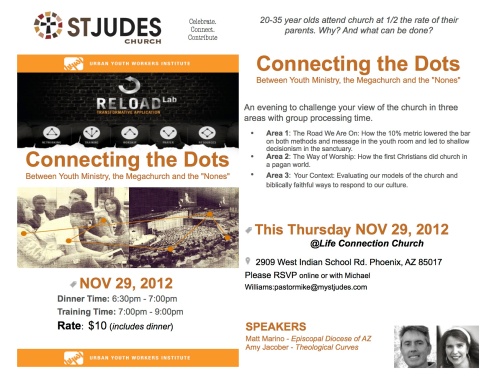Not all change is good.
We humans are remarkably insular creatures. We tend to assume that our tiny slice of experience is the way things have always been and the way they should be. The here and now is the measure of our reality. Most high school seniors, for example, have never owned a non-smartphone. Yet before the iPhone was released in 2007, most of us survived with the internet bound to our desktop. Speaking of the internet, 97% of all telecommunicated information is moved over it. But twenty years ago, unless you had a government scientist in the family, you had never heard the word “internet.” When I grew up telephones were not only wired to the wall, you had to spin a rotary dial seven times and hope the person you were calling was home to answer. In elementary school a series of amazing inventions changed the way we lived: push buttons, the answering machine, and then, a couple of years later, the telephone company (there was only one) came out with Call Waiting. If you are under forty you cannot imagine what a hassle it was to call someone for days hoping they would answer. We take these things for granted and cannot remember life without them.
In a similar vein, we assume the way we worship is the way it always has been. And, as with smartphone technology, we often assume uncritically that we are better off now than before…

Technology: “Can” doesn’t necessarily mean “should.”
Today it is common to hear the “song set” referred to as “worship” in the evangelical church. The four song and a sermon liturgy is not exactly like the iPhone – 7 years old. It is more like the internet: 40 years old, widely embraced 20 years ago, and now assumed. But is it biblical? Is this a formula found universally around the world? How does it play in say, Zimbabwe or Belarus? How does 4 songs and a sermon, fog and lights, and coffeehouse and workout rooms in the church stack up next to the unbroken witness of the worship of 2000 years of faithful Christ-followers? And, most importantly, does this help us form God’s people for the building of God’s Kingdom now and prepare us for eternity with our creator and redeemer?
The word worship comes from the Anglo Saxon “worth-ship” – the act of paying homage to God because God is worthy of being paid homage to. In scripture we see the people of God bowing before God in gratitude. In scripture worship is communal, God centered, and based in God’s glory (Ex. 12:27, 2 Chron. 29:29-31, Neh. 8:5-7, Ps. 29:1-3, Matt. 2:11, Matt. 28:17, Acts 2:42, Rev. 22:3).
Yet, far too often, what we call “worship” today is characterized by…
1. Individualism: Me and my experience
2. Narcissism: Me and my desires
3. Power: Me and my potential
And, 4. Entertainment: Me as spectator vs participant (1 Cor 14:26)
So what does Sunday morning look like at your church? Is it geared to you or to God? Look up the lyrics of the song set on your smartphone this Sunday. How often does the pronoun “I” appear versus “we”? Even more telling, how many songs could be sung unchanged if “she” was substituted for “he” and it became a love song to a girl rather than God? St. Augustine said, “He who sings prays twice.” And since, as the early Anglicans pointed out, our “praying shapes believing,” ask yourself a critical question, what exactly are we being shaped into in the church today through our sung and said prayers?
We sing songs that are, in their lyrical content, silly love songs to Jesus. Songs that not only could have been written by a secular band about a girl and the pronouns changed but, I’m told from a friend in the worship “industry,” sometimes actually were. How is it then, that…
…after teaching our young to think of Jesus in the same terms as a teen crush, we wonder why our young people’s faith has all the sustaining power of one.
We evaluate our worship by our warm feelings…feelings carefully created by melody line and key change. Bob Kauflin in his helpful book, “Worship Matters” talks about the worship leader who “spontaneously” fell to his knees in a song. Then Bob realized that the musician had preset a second microphone at knee level.
Health and wealth preachers promise us our “blessing” …if we give to their ministry, of course. I once watched a pastor justify his enormous new house to his congregation by lining up his staff on the stage behind him and telling his congregation, “Don’t hate me because I got mine. God gets me out of the way in order to bless ____” (the next one in the line). “God is going to bless ___ to get him out of the line so that he can keep blessing his way down the line…to you!” It is the God of the pyramid scheme. And we wonder why our young adults, with their BS meters attuned, tune out?
God is no longer the Lord of Creation redeeming and calling humans to join in His great mission to save a lost and dying world. He is a genie in a bottle to be rubbed in order to get more of whatever I want at that moment.
We have reversed the subject and object of our worship. The church has packaged us ourselves and is feeding it back to us. As a result, for most of the church, Sunday worship is: Of me. For me. About me.
If you want to see something sad, watch what happens when a technology is bypassed…like the film camera replaced by digital, or Western Union telegraph replaced by the ATM, or the American gas guzzler replaced by dependable Japanese imports. Sometimes the technology adapts – America now makes some really good cars. Sometimes it does not. You probably haven’t sent a telegram or dropped your film off at the Fotomat recently. What will happen in the American church? Will we continue to view the church as cruise ship?

A sign at the Urban Youth Worker’s Institute conference this Spring. What does this tell us about what the church will look like in twenty years?
I do see a sign of hope. It is found in a new generation of church musicians – ones who want to know God deeply and to help others on that journey…to worship in Spirit and truth…who know the difference between a psalm, a hymn, and a spiritual song. There is an emerging group of musicians who know that God-centered worship needs all three, and that worship is larger than just “singing.” It is a generation that understand the historic order of worship has the power to shape lives, and that the words we use in worship matter. They are not afraid of the vetted, historic words of the church. Make no mistake, they want passion…but they are not so naive as to think that emotion sustains. They long for more Scripture in sermons and more pastoring in their own lives from their pastors. They know that art gives power to the message, and that the liturgy gives a life-shaping container to both…but also that liturgy without artfulness and a clear Gospel message is like a lunch box without a meal inside.
Will this new generation of worship leaders refuse to play the good feelings game? If they do, will senior pastors adapt? Will we listen and add these young Turks critiques to what young adults are telling us with their attendance? Will we hold all of this up to the light of scripture and the great tradition? Or will we stay stuck in what we “know” from the outmoded models of the last 40 years-models that only work for a single aging and shrinking generation? If we do not, I fear evangelicalism will go the way of the Fotomat and the rotary phone.







